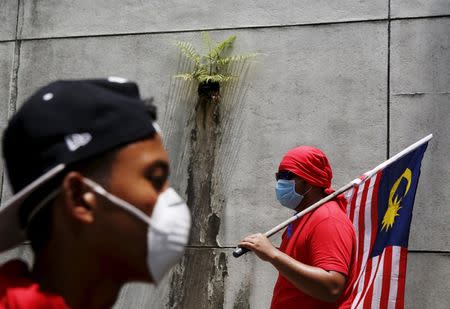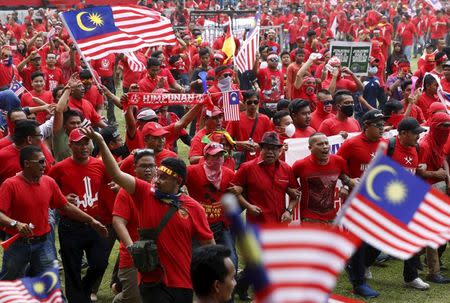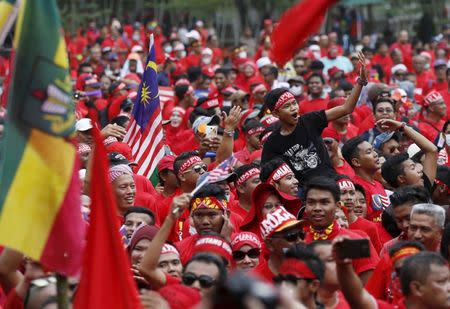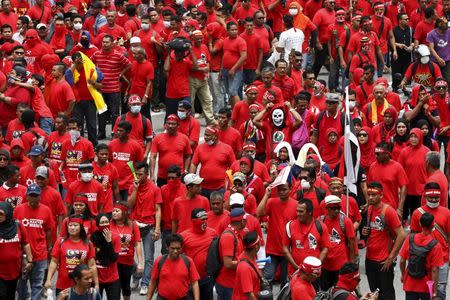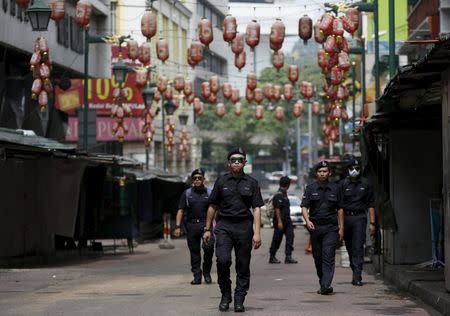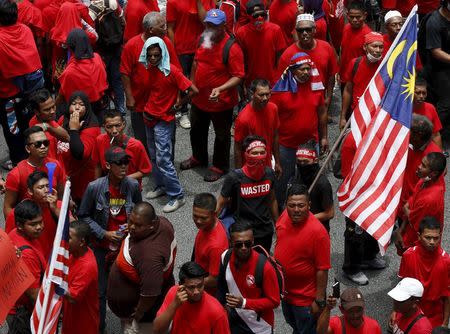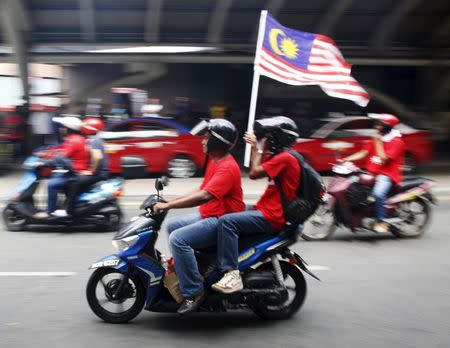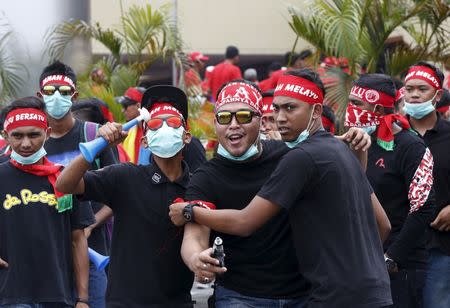Pro-government Malaysian rally raises worry about ethnic tension
By Trinna Leong and Ebrahim Harris KUALA LUMPUR (Reuters) - Tens of thousands of Malaysians, most from the majority Malay community, marched through the capital on Wednesday in a show of support for the scandal-plagued government, stoking fear of ethnic tension in the diverse Southeast Asian country. Riot police used water cannons to disperse thousands of red-shirted protesters trying to break through barricades at Kuala Lumpur's Chinatown neighborhood, shouting slogans denouncing ethnic Chinese community and opposition party leaders. There were no reports of major injuries. In an impressive show of strength, up to 30,000 marchers, according to police, thronged the city center, holding banners and shouting slogans in support of Prime Minister Najib Razak, who is battling allegations of graft and mismanagement at indebted state fund 1Malaysia Development Bhd (1MDB). Najib did not officially endorse the march but elements within his ruling United Malays National Organisation (UMNO) encouraged organizers to stage the "Malay pride" rally in response to a big anti-government protest last month that called for Najib's resignation over the graft scandal. "This protest is to tell that the official religion of this country is Islam, and Malays are the rightful owner of this country," said protester Azim Lubis. Many opposition supporters come from the ethnic Chinese minority. Relations between the two communities are delicate and Wednesday's march took place near the site of bloody race riots in 1969. The demonstration brought business to a standstill in central Kuala Lumpur, with shops and businesses, especially in Chinese-dominated neighborhoods, shuttered, and several roads closed to traffic. Kuala Lumpur's bustling Bukit Bintang tourist district was paralyzed. "A lot of vendors here were afraid to open their stores," said 74-year-old Michael Tham, who owns an electronics shop in Bukit Bintang. "It's the first time it's been this deserted." Protesters gathered on open ground near the city center for the climax of the rally before dispersing. March organizers said last month's anti-government protests, led by a pro-democracy group called Bersih, had insulted the country's Malay leaders. "Long live Malays," said one banner on Wednesday, while another said "Don't look down and insult the Malays." The opposition Bersih rally attracted many urban, ethnic Chinese people who wore yellow shirts. The red-shirted protesters on Wednesday included many young Malay men from rural areas, bussed into the city. 'RISKS' Najib, in the eastern state of Sabah for a commemoration marking the formation of the Malaysia federation in 1963, warned of the dangers of polarization. "It is not right to organize rallies dominated by one race, with the expressed aim of toppling the government," the state-run Bernama news agency quoted him as saying, referring to last month's opposition protest. "As we have seen, this then leads to rallies by other races. This could not be more dangerous and risks tearing apart the fabric of our democracy, our harmony, our unity." Malaysia is haunted by memories of the 1969 riots and ethnicity and religion are sensitive in a country where Muslim Malays make up about 60 percent of the 30 million population, with ethnic Chinese at about 25 percent and ethnic Indians about 7 percent. Since independence from Britain in 1957, Malaysia has been governed by multi-ethnic coalitions dominated by UMNO. In the 2013 election, ethnic Chinese voters deserted the coalition, and the opposition won the popular vote. Regardless of what the "red shirts" say, some of the strongest calls for Najib's ouster have come from fellow Malays, and there are clear signs of splits in UMNO. Veteran former prime minister Mahathir Mohamad, who led Malaysia and UMNO for more than two decades until his retirement in 2003, has been at the forefront of the campaign against Najib, and he took part in the Bersih protest. The former premier, along with other political leaders, denounced Wednesday's march. Najib is fighting to shore up support for his leadership, after becoming the focus of allegations of graft and financial mismanagement at indebted state fund 1Malaysia Development Bhd (1MDB). He has denied wrongdoing. (Writing by Praveen Menon; Editing by Simon Cameron-Moore and Robert Birsel)
